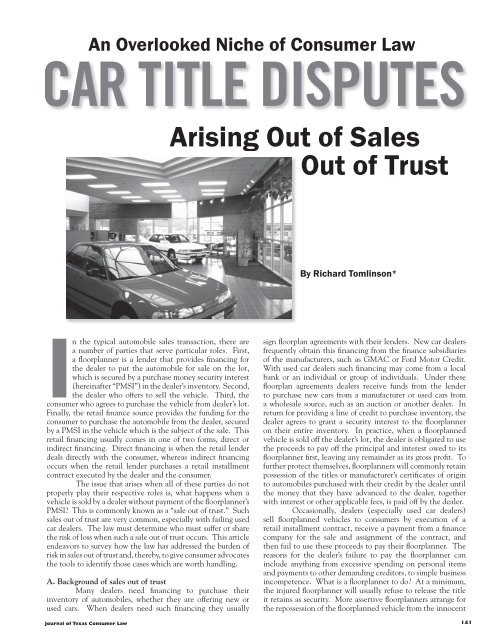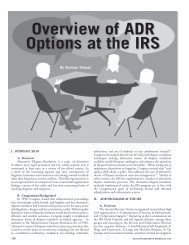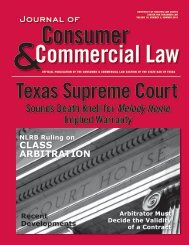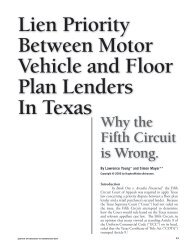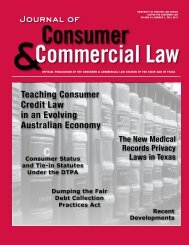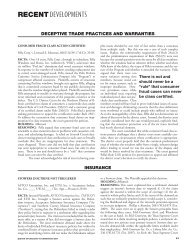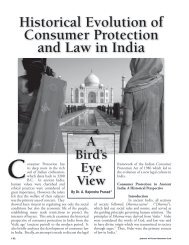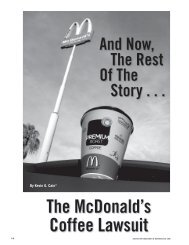Car Title Disputes - Journal of Consumer & Commercial Law
Car Title Disputes - Journal of Consumer & Commercial Law
Car Title Disputes - Journal of Consumer & Commercial Law
Create successful ePaper yourself
Turn your PDF publications into a flip-book with our unique Google optimized e-Paper software.
An Overlooked Niche <strong>of</strong> <strong>Consumer</strong> <strong>Law</strong><br />
CAR TITLE DISPUTES<br />
In the typical automobile sales transaction, there are<br />
a number <strong>of</strong> parties that serve particular roles. First,<br />
a fl oorplanner is a lender that provides fi nancing for<br />
the dealer to put the automobile for sale on the lot,<br />
which is secured by a purchase money security interest<br />
(hereinafter “PMSI”) in the dealer’s inventory. Second,<br />
the dealer who <strong>of</strong>fers to sell the vehicle. Third, the<br />
consumer who agrees to purchase the vehicle from dealer’s lot.<br />
Finally, the retail fi nance source provides the funding for the<br />
consumer to purchase the automobile from the dealer, secured<br />
by a PMSI in the vehicle which is the subject <strong>of</strong> the sale. This<br />
retail fi nancing usually comes in one <strong>of</strong> two forms, direct or<br />
indirect fi nancing. Direct fi nancing is when the retail lender<br />
deals directly with the consumer, whereas indirect fi nancing<br />
occurs when the retail lender purchases a retail installment<br />
contract executed by the dealer and the consumer.<br />
The issue that arises when all <strong>of</strong> these parties do not<br />
properly play their respective roles is, what happens when a<br />
vehicle is sold by a dealer without payment <strong>of</strong> the fl oorplanner’s<br />
PMSI? This is commonly known as a “sale out <strong>of</strong> trust.” Such<br />
sales out <strong>of</strong> trust are very common, especially with failing used<br />
car dealers. The law must determine who must suffer or share<br />
the risk <strong>of</strong> loss when such a sale out <strong>of</strong> trust occurs. This article<br />
endeavors to survey how the law has addressed the burden <strong>of</strong><br />
risk in sales out <strong>of</strong> trust and, thereby, to give consumer advocates<br />
the tools to identify those cases which are worth handling.<br />
A. Background <strong>of</strong> sales out <strong>of</strong> trust<br />
Many dealers need fi nancing to purchase their<br />
inventory <strong>of</strong> automobiles, whether they are <strong>of</strong>fering new or<br />
used cars. When dealers need such fi nancing they usually<br />
<strong>Journal</strong> <strong>of</strong> Texas <strong>Consumer</strong> <strong>Law</strong><br />
Arising Out <strong>of</strong> Sales<br />
Out <strong>of</strong> Trust<br />
By Richard Tomlinson*<br />
sign fl oorplan agreements with their lenders. New car dealers<br />
frequently obtain this fi nancing from the fi nance subsidiaries<br />
<strong>of</strong> the manufacturers, such as GMAC or Ford Motor Credit.<br />
With used car dealers such fi nancing may come from a local<br />
bank or an individual or group <strong>of</strong> individuals. Under these<br />
fl oorplan agreements dealers receive funds from the lender<br />
to purchase new cars from a manufacturer or used cars from<br />
a wholesale source, such as an auction or another dealer. In<br />
return for providing a line <strong>of</strong> credit to purchase inventory, the<br />
dealer agrees to grant a security interest to the fl oorplanner<br />
on their entire inventory. In practice, when a fl oorplanned<br />
vehicle is sold <strong>of</strong>f the dealer’s lot, the dealer is obligated to use<br />
the proceeds to pay <strong>of</strong>f the principal and interest owed to its<br />
fl oorplanner fi rst, leaving any remainder as its gross pr<strong>of</strong>i t. To<br />
further protect themselves, fl oorplanners will commonly retain<br />
possession <strong>of</strong> the titles or manufacturer’s certifi cates <strong>of</strong> origin<br />
to automobiles purchased with their credit by the dealer until<br />
the money that they have advanced to the dealer, together<br />
with interest or other applicable fees, is paid <strong>of</strong>f by the dealer.<br />
Occasionally, dealers (especially used car dealers)<br />
sell fl oorplanned vehicles to consumers by execution <strong>of</strong> a<br />
retail installment contract, receive a payment from a fi nance<br />
company for the sale and assignment <strong>of</strong> the contract, and<br />
then fail to use these proceeds to pay their fl oorplanner. The<br />
reasons for the dealer’s failure to pay the fl oorplanner can<br />
include anything from excessive spending on personal items<br />
and payments to other demanding creditors, to simple business<br />
incompetence. What is a fl oorplanner to do? At a minimum,<br />
the injured fl oorplanner will usually refuse to release the title<br />
it retains as security. More assertive fl oorplanners arrange for<br />
the repossession <strong>of</strong> the fl oorplanned vehicle from the innocent<br />
141
consumer-buyer. Even when a consumer does not<br />
fi nd the automobile repossessed in the middle <strong>of</strong><br />
the night by the fl oorplanner, the dealer’s failure<br />
to obtain title and registration for the consumer<br />
will prevent the consumer from lawfully operating<br />
the vehicle. In effect, fl oorplanners usually try to<br />
assert that the consumer and retail fi nance entity<br />
that fi nanced the sale should bear the entire risk<br />
<strong>of</strong> loss from the dealer’s failure to pay.<br />
To obtain a license to sell vehicles, used car<br />
dealers are required to have a $25,000 bond in place to<br />
cover damages incurred by buyers and others when title<br />
does not pass correctly. 1 As currently construed, this law<br />
permits consumers, retail fi nance entities and wholesalers<br />
to sue dealers who are <strong>of</strong>ten defunct, obtain judgments,<br />
and then recover the amount <strong>of</strong> these judgments against<br />
the applicable dealer bond <strong>of</strong> $25,000. 2 Interestingly<br />
enough, fl oorplanners would usually have no claim to<br />
recovery under the bond. 3<br />
Problems frequently arise because the $25,000<br />
bond will usually only cover the loss associated with one<br />
or two automobiles. The bond also only covers claims<br />
occurring during the 12-month term <strong>of</strong> the bond that<br />
have been reduced to judgment. These bonds are sureties<br />
which most <strong>of</strong>ten pay claims in order <strong>of</strong> presentment.<br />
Thus, the surety bond is paid on a fi rst-come-fi rst-serve basis<br />
with the fi rst claimant recovering up to the amount <strong>of</strong> the<br />
$25,000 face value <strong>of</strong> the bond, reducing the value, while<br />
each subsequent claim reduces the value <strong>of</strong> the bond until<br />
fully depleted. When a dealer sells out <strong>of</strong> trust, however, it is<br />
common for the dealer to sell a whole raft <strong>of</strong> vehicles out <strong>of</strong><br />
trust before it is discovered. When the minimal dealer bond<br />
is not enough to cover the potential loss, the question <strong>of</strong> who<br />
bears the risk <strong>of</strong> loss must be addressed squarely. Unfortunately,<br />
in these circumstances, the law in Texas is not clear on the<br />
placement <strong>of</strong> the risk <strong>of</strong> loss.<br />
B. Who should bear the risk <strong>of</strong> loss?<br />
The fl oorplanner, who holds the position that the<br />
consumer and retail fi nance entity should bear the full risk<br />
<strong>of</strong> the loss, will usually argue that the purported sale <strong>of</strong> the<br />
vehicle to the consumer by the dealer was void due to the<br />
failure <strong>of</strong> the dealer to possess title or to transfer title at the<br />
time <strong>of</strong> sale. Floorplanners rely specifi cally on the Texas<br />
Transportation Code (hereinafter “Transportation Code”),<br />
and in particular the Certifi cate <strong>of</strong> <strong>Title</strong> Act (hereinafter<br />
“COTA”). 4 The Transportation Code § 501.071(a) provides<br />
that “[a] motor vehicle may not be the subject <strong>of</strong> a subsequent<br />
sale unless the owner designated on the certifi cate <strong>of</strong> title<br />
transfers the certifi cate <strong>of</strong> title at the time <strong>of</strong> sale.” 5 In addition,<br />
Transportation Code § 501.152 provides that it is an <strong>of</strong>fense to<br />
sell or <strong>of</strong>fer to sell a motor vehicle registered in this state when<br />
the seller “does not possess the title receipt or certifi cate <strong>of</strong><br />
title for the vehicle.” 6 Thus, since the Transportation Code, §<br />
501.073 provides that “[a] sale made in violation <strong>of</strong> this chapter<br />
is void and title may not pass . . . ,” 7 fl oorplanners argue that no<br />
title passes when they are holding the title and the dealer did<br />
not transfer title at the time <strong>of</strong> the purported sale.<br />
In a number <strong>of</strong> cases where fl oorplanners, wholesalers<br />
and other sellers were paid with drafts that bounced, several<br />
Texas appellate courts have accepted this COTA argument and<br />
have found subsequent sales by dealers to be void. 8 What does<br />
this mean in practice? The fl oorplanner retains title, is entitled<br />
to possession <strong>of</strong> the vehicle sold out <strong>of</strong> trust, and the innocent<br />
consumer must bear the entire risk <strong>of</strong> loss. The practical result<br />
T o obtain a<br />
license to sell<br />
vehicles, used<br />
car dealers<br />
are required to<br />
have a $25,000<br />
bond in place to<br />
cover damages<br />
incurred by<br />
buyers and<br />
others when title<br />
does not pass<br />
correctly.<br />
places every consumer in peril. Giving legal<br />
signifi cance to the mere possession <strong>of</strong> a<br />
certifi cate <strong>of</strong> title provides the fl oorplanning<br />
lender the best <strong>of</strong> both worlds by permitting<br />
it’s inventory collateral to be exposed for<br />
sale to the public from which proceeds are<br />
generated for the dealer to pay the secured<br />
debt, and empowering that lender to render<br />
void, retroactively, any sale <strong>of</strong> which it does<br />
not approve.<br />
1. Agency Exception<br />
In an effort to ameliorate the<br />
harshness <strong>of</strong> this COTA rule, other courts<br />
have found an exception based on an<br />
agency relationship between the dealer<br />
and the fl oorplanner. Initially, these courts<br />
cite to the recognized rule that a sale <strong>of</strong> an<br />
automobile may still be valid as between a<br />
buyer and a seller despite non-compliance<br />
with COTA. 9 If proven that the dealer was<br />
acting as the agent <strong>of</strong> the fl oorplanner in<br />
selling the vehicle, a number <strong>of</strong> courts have<br />
recognized that the innocent consumer<br />
who purchased from the dealer is entitled to<br />
retain possession and to receive title, even if<br />
COTA was violated in the process. 10 These courts recognize<br />
that if the dealer as agent <strong>of</strong> the fl oorplanner was authorized to<br />
sell a vehicle to the buyer, the sale would be effective as between<br />
the fl oorplanner (the actual seller) and the buyer. 11 Under<br />
these circumstances, the fl oorplanner would bear the risk <strong>of</strong> loss<br />
associated with its own agent’s faithlessness. 12 In other words,<br />
the fl oorplanner would bear the loss <strong>of</strong> the money that the dealer<br />
failed to pass on to the fl oorplanner following the sale.<br />
This agency exception to the general rule requiring<br />
compliance with COTA does not always provide protection to<br />
innocent consumers. For example, in Morey v. Page, the Dallas<br />
Court <strong>of</strong> Appeals found inadequate evidence <strong>of</strong> the agency<br />
relationship. 13 In that case, Page consigned a 1967 Bentley for<br />
sale by Yardley under the stipulation that he recover a $20,000<br />
net pr<strong>of</strong>i t. Yardley negotiated the sale <strong>of</strong> the Bentley to Morey<br />
for only $9,000, and Yardley absconded with these funds. The<br />
Dallas Court <strong>of</strong> Appeals found no express authority for the<br />
sale due to the failure to meet the consignment condition <strong>of</strong> a<br />
$20,000 net return and no apparent authority due to the fact<br />
that Yardley never disclosed that he was acting on behalf <strong>of</strong><br />
Page. 14 Given the fact that the strength <strong>of</strong> the evidence in<br />
favor <strong>of</strong> agency will vary greatly between different cases, this<br />
exception provides at best an uncertain lifeline to innocent<br />
purchasers. If the innocent purchaser is buying from a licensed<br />
dealer, in a transaction that has the appearance <strong>of</strong> a sale in the<br />
ordinary course <strong>of</strong> the dealer’s business, why should the validity<br />
<strong>of</strong> the sale be dependent upon a prior transaction between<br />
the dealer and an undisclosed principal? The Texas Uniform<br />
<strong>Commercial</strong> Code 15 (hereinafter “U.C.C.”) provides rules <strong>of</strong><br />
priority that protect buyers in the ordinary course <strong>of</strong> business<br />
in such circumstances.<br />
2. U.C.C. alternative<br />
If the U.C.C. applies in the context <strong>of</strong> a sale out <strong>of</strong><br />
trust by a dealer, an innocent purchaser would be accorded<br />
title and the risk <strong>of</strong> loss associated with the dealer’s defalcation<br />
would be placed squarely upon the fl oorplanner. In a majority<br />
<strong>of</strong> the states, the U.C.C. prevails over the applicable COTA in<br />
cases involving out <strong>of</strong> trust sales. 16 Interestingly enough, the<br />
Transportation Code specifi cally provides that it is to yield to<br />
the U.C.C. where there is a confl ict between these two bodies<br />
142 <strong>Journal</strong> <strong>of</strong> Texas <strong>Consumer</strong> <strong>Law</strong>
<strong>of</strong> law. 17 Several Texas courts have recognized the U.C.C. as<br />
an alternative source <strong>of</strong> law, which unlike the COTA rule and<br />
the agency exception, provides a bright line rule.<br />
Based on the U.C.C., innocent buyers are entitled to<br />
receive title in “out <strong>of</strong> trust” sales under one <strong>of</strong> two theories.<br />
The fi rst theory involves the Texas Business and Commerce<br />
Code (hereinafter “U.C.C.”) § 2.403(a) which states that a<br />
person “with voidable title has power to transfer a good title to<br />
a good faith purchaser for value,” and “[w]hen goods have been<br />
delivered under a transaction <strong>of</strong> purchase the purchaser has<br />
such power even though . . . the delivery was in exchange for a<br />
check which is later dishonored . . . or the delivery was procured<br />
through fraud punishable as larcenous under the criminal<br />
law.” 18 In effect, the courts construing these provisions have<br />
held that a purchaser who procured a good, such as a vehicle,<br />
with a check or draft that was dishonored nevertheless had<br />
voidable title to pass and that a good faith buyer from such a<br />
fraudulent purchaser was entitled to receive title. 19<br />
The second theory involves the U.C.C § 2.403(b)<br />
which provides that the “entrusting <strong>of</strong> possession <strong>of</strong> goods to<br />
a merchant who deals in goods <strong>of</strong> that kind gives him power<br />
to transfer all rights <strong>of</strong> the entruster to a buyer in the ordinary<br />
course <strong>of</strong> business.” 20 In addition, U.C.C § 1.201(9) states a<br />
“‘buyer in the ordinary course <strong>of</strong> business’ means a person who<br />
in good faith and without knowledge that the sale to him is in<br />
violation <strong>of</strong> the ownership rights or security interest <strong>of</strong> a third<br />
party in the goods buys in ordinary course from a person in the<br />
business <strong>of</strong> selling goods <strong>of</strong> that kind but does not include a<br />
pawnbroker.” 21 Under U.C.C section 2.401(b), title to goods<br />
passes when the seller completes physical delivery <strong>of</strong> the goods,<br />
even if a document <strong>of</strong> title is to be delivered at a different time<br />
and place. 22 These statutes together make a strong argument<br />
that title passes from the seller to the buyer regardless <strong>of</strong> the<br />
security interest <strong>of</strong> a third party who places their interest in<br />
risk when entrusting their goods to a merchant.<br />
Under an amendment to COTA passed in 1971 and<br />
intended to be a reversal <strong>of</strong> the ruling in Phil Phillips 23 on the<br />
inapplicability <strong>of</strong> the U.C.C. to automobile title issues, the<br />
provisions <strong>of</strong> the U.C.C. are supposed to prevail over COTA<br />
in the event <strong>of</strong> any confl ict. 24 This amendment should have<br />
established that U.C.C. §§ 2.401 and 2.403 control over<br />
the COTA’s provisions which purport to void the sale <strong>of</strong> an<br />
automobile absent possession <strong>of</strong> title by the seller at the time<br />
<strong>of</strong> sale or absent a transfer <strong>of</strong> title at the time <strong>of</strong> sale. 25<br />
While the confl ict between the U.C.C. good faith<br />
buyer provisions and the COTA is clear, the Dallas Court <strong>of</strong><br />
Appeals and a few other courts have attempted to “harmonize”<br />
the statutes and thereby avoid the resulting U.C.C. control in<br />
the event <strong>of</strong> a confl ict. 26 The existence <strong>of</strong> a confl ict between<br />
sections 2.401 and 2.403 <strong>of</strong> the U.C.C. and COTA is clear,<br />
and the U.C.C. should govern title disputes arising from “out<br />
<strong>of</strong> trust” sales. The Tyler Court <strong>of</strong> Appeals and the United<br />
States Bankruptcy Court for the Northern District <strong>of</strong> Texas<br />
have recognized this confl ict and have given full effect to<br />
the U.C.C.. 27 Likewise, two justices on the Dallas Court <strong>of</strong><br />
Appeals have recognized the confl ict and opined that U.C.C.<br />
§ 2.403(b) should be given full effect. 28<br />
3. Recent cases fi nding that COTA is inapplicable<br />
On January 27, 2003, the U.S. District Court for<br />
the Southern District <strong>of</strong> Texas in In re Dota, concluded that a<br />
dealer was not an “owner” for purposes <strong>of</strong> Transportation Code<br />
section 501.071 which means the failure to transfer title did<br />
not render a sale from a dealer to a consumer invalid under<br />
Transportation Code § 501.073. 29 The court further held that<br />
neither the Transportation Code nor the U.C.C. permitted a<br />
<strong>Journal</strong> <strong>of</strong> Texas <strong>Consumer</strong> <strong>Law</strong><br />
fl oorplanner to assert a security interest to a vehicle held as<br />
inventory by merely retaining possession <strong>of</strong> the title. 30 The<br />
court applied the U.C.C. fi nding that a cash buyer was a buyer<br />
in the ordinary course <strong>of</strong> business under U.C.C. § 1.201(9)<br />
and consequently free to take title to a vehicle, despite having<br />
failed to demand a transfer <strong>of</strong> title at the time <strong>of</strong> sale. 31 This<br />
decision was appealed to the Fifth Circuit, but the appeal was<br />
dismissed on jurisdictional grounds. 32<br />
More recently on August 27, 2004, the Texas Court<br />
<strong>of</strong> Appeals in Corpus Christi took a different track to rule<br />
for an innocent consumer buyer. 33 In First National Bank <strong>of</strong><br />
El Camp v. Buss, concerning a classical sale “out <strong>of</strong> trust”<br />
transaction involving the same dealer as in the In re Dota case,<br />
this appellate court, unlike the Dallas Court <strong>of</strong> Appeals and<br />
the 5th Circuit Court <strong>of</strong> Appeals, found a confl ict between the<br />
COTA and the U.C.C. and applied the U.C.C. 34 Finding the<br />
consumer to be a “buyer in the ordinary course <strong>of</strong> business,”<br />
the Court thereby affi rmed the trial court’s fi nding that the<br />
consumer should receive title free <strong>of</strong> the bank’s inventory<br />
lien. 35 The bank defendant has fi led a petition for review<br />
with the Texas Supreme Court, which has been pending since<br />
November 1, 2004. 36 Should the Texas Supreme Court decide<br />
to take the case, the issues raised in the foregoing cases will<br />
fi nally be resolved. How these issues will pan out before the<br />
current Texas Supreme Court is anyone’s guess.<br />
Based on the In re Dota and<br />
First National Bank <strong>of</strong> El<br />
Campo rulings, COTA would never apply to cases involving<br />
dealers who made “out <strong>of</strong> trust” sales. Under In re Dota, there is<br />
no need to argue that there is a confl ict between COTA and the<br />
U.C.C., so that the preemption provision in COTA becomes<br />
effective. By contrast, under First National Bank <strong>of</strong> El Campo,<br />
there is a confl ict between COTA and the U.C.C. and this<br />
means that the U.C.C. prevails. In short, if the In re Dota and<br />
First National Bank <strong>of</strong> El Campo cases are followed, the bright line<br />
rule <strong>of</strong> the U.C.C. will apply to all “out <strong>of</strong> trust” cases involving<br />
automobile dealers, and the cases applying COTA to such issues<br />
in the past could be ignored. One can only hope this is where<br />
the law shakes out, as the U.C.C. provides a rule which is both<br />
more fair and more clear than COTA.<br />
C. Conclusion<br />
Even if In re Dota and First National Bank <strong>of</strong> El Campo<br />
are not followed in the future, practitioners should expect a<br />
change in the law nevertheless. The Conference on Uniform<br />
<strong>Law</strong>s is considering proposals for changes in the uniform COTA<br />
that would recognize the BFP rule now solely recognized in the<br />
U.C.C. Should such proposed amendments to our COTA be<br />
passed by the Texas Legislature, innocent consumer-purchasers<br />
will be protected, even if our courts fail to recognize that the<br />
U.C.C. should apply.<br />
* Richard Tomlinson is Board Certifi ed in <strong>Consumer</strong> and<br />
<strong>Commercial</strong> <strong>Law</strong> by the Texas State Bar. With over 25 years<br />
<strong>of</strong> experience, in handling consumer claims, Mr. Tomlinson<br />
has dedicated his practice to representing consumers in a<br />
wide variety <strong>of</strong> cases including: deception in new or used car<br />
deals, odometer rollback fraud, repossession <strong>of</strong> automobiles<br />
and mobile homes, payday loans and usury, and fair debt<br />
collection. Special thanks to Donald L. Turbyfi ll for his insight<br />
and assistance.<br />
1. TEX. TRANSP. CODE § 503.033 (2004).<br />
2. Old Republic Surety Company v. Reyes, 2002<br />
Tex. App. LEXIS 5649 (Tex. App. - Dallas 2002, pet.<br />
denied)(consumer); Grammercy Ins. Co. v. Arcadia Financial<br />
143
Ltd., 96 S.W.3d 320, 323-26 (Tex. App. - Austin 2001, pet.<br />
denied)(retail fi nance company); Grammercy Ins. Co. v.<br />
Auction Fin. Program, 52 S.W.3d 360, 363-68 (Tex. App.<br />
—Dallas 2001, pet. denied)(auction house); Grammercy Ins.<br />
Co. v. Arcadia Fin. Ltd., 32 S.W.3d 402, 407 (Tex. App.—<br />
Houston [14th Dist.] 2000, no pet.)(retail fi nance company);<br />
<strong>Law</strong>yers Surety Co. v. Royal Chevrolet, 847 S.W.2d 624, 626-<br />
27 (Tex. App- Texarkana 1993, no writ) (wholesaler); Geters<br />
v. Eagle Ins. Co., 834 S.W.2d 49, 50 (Tex. 1992) (consumer).<br />
3. Grammercy Ins. Co. v. MRD Investments, Inc., 47<br />
S.W.3d 721, 727 (Tex. App. - Houston [14th Dist.] 2001, pet.<br />
denied); <strong>Law</strong>yers Surety Corporation v. Riverbend Bank, 966<br />
S.W.2d 182, 185-87 (Tex. App. - Fort Worth 1998, no pet.).<br />
4. TEX. TRANSP. CODE § 501.071 (2004).<br />
5. TEX. TRANSP. CODE § 501.071(a) (2004).<br />
6. TEX. TRANSP. CODE § 501.152 (2004).<br />
7. TEX. TRANSP. CODE § 501.073 (2004).<br />
8. Bank One Texas N.A. v. Arcadia Fin. Ltd., 219 F.3d 494,<br />
497-98 (5th Cir. 2000); Allstate Ins. Co. v. Troy’s Foreign<br />
Auto Parts, 2001 LEXIS 5029 (Tex. App.--Dallas 2001);<br />
Gallas v. <strong>Car</strong> Biz. Inc., 914 S.W.2d 592, 594-95 (Tex. App.—<br />
Dallas 1995, pet. denied); Everett v. United States Fire Ins.<br />
Co., 653 S.W.2d 948, 950 (Tex. App.--Fort Worth, no writ);<br />
Boswell v. Connell, 556 S.W.2d 624, 625-26 (Tex. Civ.<br />
App.—Beaumont 1977, writ ref’d n.r.e.).<br />
9. Phil Phillips Ford, Inc. v. St. Paul Fire & Marine Ins. Co.,<br />
465 S.W.2d 933, 937 (Tex. 1971); Hudson Buick, Pontiac,<br />
GMC Truck v. Gooch, 7 S.W.3d 191, 197 (Tex. App.—Tyler<br />
1999, pet. denied); Tyler <strong>Car</strong> v. Empire Fire & Marine Ins.<br />
Co., 2 S.W.3d 482, 485 (Tex. App.--Tyler 1999, pet. denied);<br />
Jarrin v. Sam White Oldsmobile Co., 929 S.W.2d 21, 24 (Tex.<br />
App.--Houston [1st Dist.] 1996, writ denied); Najarian v.<br />
David Taylor Cadillac, 705 S.W.2d 809, 811-12 (Tex. App.—<br />
Houston [1st Dist.] 1986, no writ).<br />
10. Morey v. Page, 802 S.W.2d 779, 784 (Tex. App.—Dallas<br />
1990, no writ); IFG Leasing Co. v. Ellis, 748 S.W.2d 564,<br />
566 (Tex. App.—Houston [1st Dist.] 1988, no writ); Cash v.<br />
Lebowitz, 734 S.W.2d 396, 398 (Tex. App.--Dallas 1987, writ<br />
ref’d n.r.e.); Jim Stephenson Motor Co., Inc. v. Amundson,<br />
711 S.W.2d 665, 669 (Tex. App.—Dallas 1986, writ ref’d<br />
n.r.e.); Pfl uger v. Colquitt, 620 S.W.2d 739, 743 (Tex. Civ.<br />
App.—Dallas 1981, writ ref’d n.r.e.).<br />
11. Morey, 802 S.W.2d at 784.<br />
12. Cash, 734 S.W.2d at 399; Pfl uger, 620 S.W.2d at 743.<br />
13. Morey, 802 S.W.2d at 799.<br />
14. Morey, 802 S.W.2d at 782-85.<br />
15. The Texas Uniform <strong>Commercial</strong> Code refers to TEX. BUS.<br />
& COM. CODE, <strong>Title</strong> 1, Ch. 1-9 enacted July 1, 2001.<br />
16. See, e.g., Madrid v. Bloomington Auto Co., Inc., 782<br />
N.E.2d 386, 391-97 (Ind. App. 2003); Jones v. Mitchell,<br />
816 So.2d 68, 69-72 (Ala. App. 2001); Cherry Creek<br />
Dodge, Inc. v. <strong>Car</strong>ter, 733 P.2d 1024, 1027-29 (Wyo. 1987);<br />
Dartmouth Motor Sales, Inc. v. Wilcox, 517 A.2d 804,<br />
806-07 (N.H. 1986); Big Knob Volunteer Fire Co. v. Lowe<br />
& Moyer Garage, Inc., 487 A.2d 953, 956-59 (Pa. Super.<br />
1985); Atwood Chevrolet-Olds, Inc. v. Aberdeen Mun.<br />
School Dist., 431 So.2d 926, 927-29 (Miss. 1983); Martin v.<br />
Nager, 469 A.2d 519, 522-26 (N.J. Super. 1983); Roger D.<br />
Billings, FLOOR PLANNING, RETAIL FINANCING & LEASING IN THE<br />
AUTOMOBILE INDUSTRY §§ 5.36 - 5.41 (West 1998).<br />
17. TEX. TRANSP. CODE § 501.005 (2004).<br />
18. TEX. BUS. & COM. CODE § 2.403(a) (2004).<br />
19. Prestige Ford v. Dallas Postal Credit Union, 2002<br />
Tex. App. LEXIS 974, * 11-13 (Tex. App.—Dallas 2002)<br />
(dishonored draft); Perry v. Breland, 16 S.W.3d 182, 190<br />
(Tex. App.—Eastland 2000, pet. denied) (dishonored check);<br />
Villa v. Alvarado State Bank, 611 S.W.2d 483, 487-88 (Tex.<br />
App.—Waco 1981, no writ) (dishonored check); Leif Johnson<br />
Ford, Inc. v. Chase Nat’l Bank, 578 S.W.2d 792, 794 (Tex.<br />
Civ. App.—Beaumont 1978, no writ) (“Section 2.403(a) gives<br />
good faith purchasers <strong>of</strong> even fraudulent buyers-transferors<br />
greater rights than the defrauded seller can assert.”).<br />
20. TEX. BUS. & COM. CODE § 2.403(b) (2004).<br />
21. TEX. BUS. & COM. CODE § 1.201(9) (2004).<br />
22. TEX. BUS. & COM. CODE § 2.401(b) (2004).<br />
23. Phil Phillips Ford, Inc. v. St. Paul Fire & Marine Ins. Co.,<br />
465 S.W.2d 933, 937 (Tex. 1971).<br />
24. TEX. TRANSP. CODE § 501.005 (2004).<br />
25. TEX. BUS. & COM. CODE §§ 2.401, 2.403(a) (2004).<br />
Hudson Buick, Pontiac, GMC Truck v. Gooch, 7 S.W.3d<br />
191, 198 (Tex. App.—Tyler 1999, pet. denied); In re Bailey<br />
Pontiac, Inc., 139 B.R. 629, 633 n.3 (Bankr. N.D. Tex. 1992).<br />
26. Gallas v. <strong>Car</strong> Biz. Inc., 914 S.W.2d 592, 594-95 (Tex.<br />
App.—Dallas 1995, pet. denied); Morey v. Page, 802 S.W.2d<br />
779, 783-84 (Tex. App.—Dallas 1990, no writ); Everett v.<br />
U.S. Fire Ins. Co., 653 S.W.2d 948, 950 (Tex. App.—Fort<br />
Worth 1983, no writ); Pfl uger v. Colquitt, 620 S.W.2d 739,<br />
741-42 (Tex. Civ. App.—Dallas 1981, writ ref’d n.r.e.); Bank<br />
One Texas N.A. v. Arcadia Fin. Ltd., 219 F.3d 494, 497 (5th<br />
Cir. 2000).<br />
27. Hudson Buick, 7 S.W.3d at 198; In re Bailey Pontiac, Inc.,<br />
139 B.R. at 633 n. 3.<br />
28. TEX. BUS. & COM. CODE § 2.403 (2004), provides:<br />
“(b) Any entrusting <strong>of</strong> possession <strong>of</strong> goods to a merchant<br />
who deals in goods <strong>of</strong> that kind gives him power to transfer<br />
all rights <strong>of</strong> the entruster to a buyer in ordinary course<br />
<strong>of</strong> business.” Gallas, 914 S.W.2d at 595-601 (Wright, J.,<br />
dissenting); Pfl uger, 620 S.W.2d at 744-48 (Stephens, J.,<br />
concurring).<br />
29. In re Dota, 288 B.R. 448, 455-58 (S.D. Tex. 2003).<br />
30. Id. at 458-60.<br />
31. Id. at 460-61.<br />
32. Id.<br />
33. First Nat’l Bank <strong>of</strong> El Campo v. Buss, 143 S.W.3d 915<br />
(Tex. App.—Corpus Christi 2004, pet. pending).<br />
34. Id.<br />
35. Id.<br />
36. Id.<br />
144 <strong>Journal</strong> <strong>of</strong> Texas <strong>Consumer</strong> <strong>Law</strong>


